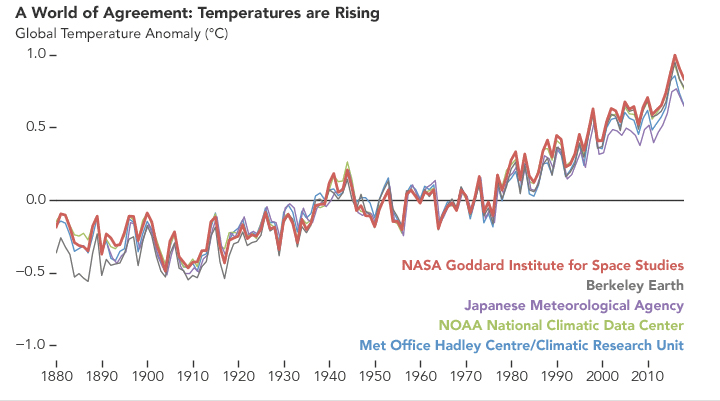At EnvirOx, we stand for the health and wellness of all people and for a better environment that supports our future generations. We believe that sustainability is a shared responsibility belonging to all of us and especially now, a call to action. You can read more about our mission, culture, and environmental impact in our Why Envirox? section of the site.
But this post isn't about EnvirOx. It’s an invitation to see and own more of our shared responsibility, so we can take the necessary actions to create a sustainable future for the next generations. Reducing the environmental footprint of cleaning has been one of our leading values since our founding a little more than 20 years ago. Now, let's look at how our world has changed over the last 20 years:
- Since 1975, the average global temperature has increased at a rate of .15-.20° C per decade. Since 1880, the global temperature has increased .8° C or 1.4° F. While that might not seem like a lot, it takes a lot of heat to warm an entire globe. To put this in perspective, a 5° cooling of the Earth created the last Ice Age 20,000 years ago, covering North America, Europe, and much of Asia in sheets of ice.1
- The 19 warmest years (since it was measured starting in 1850) have occurred since the year 2001.2
- Carbon dioxide emissions reached a record high in 2018.3 In the US, this is likely because even though coal-fired power was on the decline, natural gas has taken over the slack instead of more renewable forms of energy.4
- Warming oceans and melting land-based ice (glaciers, ice sheets) have caused the sea level to rise 2.6 inches since 1993. The oceans absorb 90% of increased atmospheric heat from human activity.5
- 1 in 5 species may be at risk due to climate change. Especially those on small islands or in the mountains. In February of 2019, the Australian government officially recognized the first extinction due to climate change. A small rodent known as the Bramble Cay melomys made its home on a small island on the Great Barrier Reef that was eventually inundated by rising seawater.6
97% or more of active, publishing climate scientists agree that climate-warming trends over the past century are extremely likely due to human activities.7 There is a silver lining in this data. Our choices make an impact and we can take action in the direction of sustainability.

Image courtesy NASA.gov.1
We are encouraged by students like Greta Thunberg and her friends who are reminding us that they are the next generation. As the next generation they are asking politicians, thought leaders and others to not “kick this issue down the road”; rather put action steps in place NOW. This is a global issue where the world needs to reduce the emissions of fossil fuels.
As individuals and businesses, we can reduce the heat-trapping gasses in our atmosphere. We can reduce the sources of these gasses (by reducing the burning of fossil fuels) and help enhance the natural processes that, in the past, have helped correct these build-ups. We can work together to build a brighter future for the next generation.
If you want to find out more about climate change and what you can do to help, start by exploring these resources:
Environmental Defense Fund
The Sierra Club
World Wildlife Fund